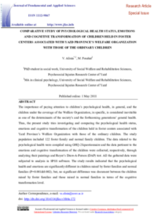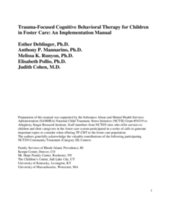Displaying 231 - 240 of 525
This thesis took on a meta-analytical approach to examine sources of heterogeneity between studies evaluating the effect of foster care on adaptive functioning, cognitive functioning, externalizing behavior, internalizing behavior, and total problems behavior.
This study examines the mental health of adolescents living with HIV (ALHIV) in Namibia, and the factors that contribute to mental health problems.
This study evaluated the implementation of Trauma-systems Therapy-Foster Care (TST-FC) in two state child welfare agencies that included training for staff and resource parents.
The current service-data study explored the emotional and behavioural symptom trajectories of 207 young people under the long-term care of a local authority in the South West of England, over their first five years in the care system.
The current service-data study explored the emotional and behavioural symptom trajectories of 207 young people under the long-term care of a local authority in the South West of England, over their first five years in the care system.
The present study tries investigating and comparing the psychological health status, emotions and cognitive transformation of the children held in foster centers associated with Yazd Province’s Welfare Organization with those of the ordinary children.
This manual, supported by the U.S. Substance Abuse and Mental Health Services Administration (SAMHSA) National Child Traumatic Stress Initiative (NCTSI) Grant, offers guidance on the implementation of Trauma-Focused Cognitive Behavioral Therapy (TF-CBT) with children in foster care and their families.
This study presents longitudinal analyses of the case flow of youth aged 3–17 in Washington State's foster care system, tracking rates of screening, scoring above or below clinical criteria cutoff scores, and service receipt.
The authors of this paper conducted a systematic review with the aim of developing a better understanding of the psychosocial factors associated with the behavioral health of children in foster and kinship care.
With the support community and academic partners, a school-based health center administered by a Federally Qualified Health Center developed a plan for outreach, systematic screening and referral to services for newcomer youth.


